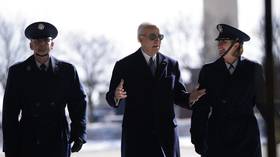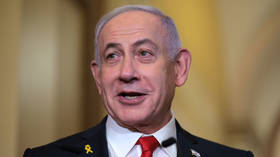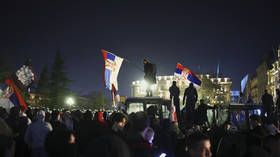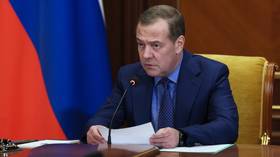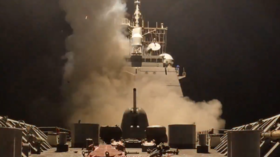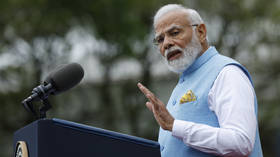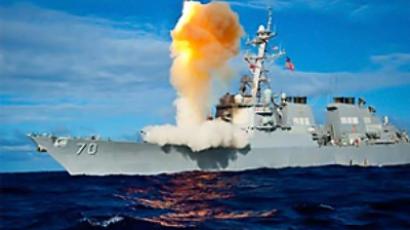Does America consider Russia friend or foe? Antimissile system will show

Washington and NATO have recently declared the intention of enhancing their partnership with Russia, but the proof of the pudding is in the eating, the saying goes, not in the promises.
The “reset” of relations between the United States and Russia increasingly resembles a backroom card game, where the players are trying to read each other’s cards and gain an advantage however possible. Indeed, it is all too easy to imagine a smoky casino hall, rigged with secret mirrors and contraptions for delivering an ace from the sleeve. This is unfortunate, and potentially tragic, because what the players are gambling with is the very life of the Strategic Arms Reduction Treaty (START), which is now being heatedly debated on the Senate floor.
The new START treaty, signed by Presidents Medvedev and Obama on April 8, 2010, promises to slash the nuclear stockpiles of the respective countries by 33 per cent, limiting the number of operationally deployed nuclear warheads to 1,550, while also reducing the number of ICBM launch vehicles and platforms to 800. Granted, there still exists the possibility of destroying the planet about 500 times, but, as the name of treaty suggests, it is a start.
This historic document, which presumes to make the world a far less volatile place, hinges on several factors as far as the US Republicans are concerned: the downsized nuclear arsenal must receive a multi-billion dollar makeover (in order to understand the mentality of the modern American Republican, which is anything but conservative, it is merely necessary to follow the money scent).
"As far as I'm concerned,” Sen. Jon Kyle (Ariz.), a leading Republican spokesman on the treaty, told an audience at the National Defense University, “it's got to be an absolute commitment to adequate funding for everything that has to be done."
(Last week, the White House released a summary report showing that spending on the modernization of the nuclear weapons complex over the decade will hit $80 billion, increasing from $6.4 billion this year to $7 billion in coming years and eventually topping $8 billion beginning in 2016. An additional $100 billion will go into strategic nuclear delivery systems, including bombers and land- and sea-based intercontinental ballistic missiles. So Joe Taxpayer is mistaken if he thought the START treaty reductions would somehow translate into less money for the military-industrial complex).
But more to the point, US lawmakers are also demanding that START not interfere with the Bush administration’s antimissile brainchild in Eastern Europe, practically on Russia’s doorstep, for the ostensible purpose of shooting down rogue-nation missiles. Moscow has threatened to pull out of the treaty if the system threatens Russia’s security.
Down with missile, up with shields!
Speaking at a session of the Russian State Duma on Wednesday, Russian Foreign Minister Sergey Lavrov touted the treaty, which he said helps to maintain nuclear parity between Russia and the United States. Lavrov went on to warn, however, that the new START pact, which allows Washington to develop its missile defense system, should not do so at the expense of Russia’s national security (The State Duma plans to start debating the ratification of the updated START Treaty in the coming days).
At yesterday’s Senate hearing, US Secretary of State Hillary Clinton and Defense Secretary Robert Gates sought to deflect criticism from the Republicans that the agreement could undermine US plans for missile defense.
"Nothing in the treaty will constrain our missile defense efforts," Clinton said. The United States was "not bound" by Russia’s opposition to missile defense and had declared plans "to continue improving and deploying its missile defense systems," she added.
Republican Senator Bob Corker expressed skepticism at the remarks, arguing that Moscow had a different take of how America’s determination to build missile defenses in Europe could affect, perhaps fatally, the treaty.
"Shouldn't it trouble us that, before we ever get started, that each of the countries has a very different opinion of what we've negotiated as it relates to missile defense," Corker ventured to ask.
Nonetheless, Gates seemed totally indifferent to Russia’s position, arguing instead that Moscow has always objected to anti-missile programs.
The defense secretary, who is a former CIA director, said "the Russians have hated missile defense ever since the strategic arms talks began in 1969."
"And so the notion that this treaty has somehow focused this antagonism on the part of the Russians toward missile defense, all I would say is it's the latest chapter in a long line of Russian objections to our proceeding with missile defense," he said.
Gates then ventured a reason for Russia’s opposition to the system as “probably because we can afford it and they can't." The secretary of defense then cited major funding in next year's budget to bolster US missile defense systems as proof that "we are putting our money where our beliefs are."
Some might be tempted to say instead that the United States is “putting their beliefs where the money is,” especially when we consider that the budget for 2011 sets aside $19.9 billion for missile defense radars, interceptors and launch pads.
Let the contradictions begin
There are several disturbing things about Mr. Gates’ blithe comment concerning Russia’s "inability" to fund a missile defense system as a reason for ignoring Moscow’s concerns. First, let’s assume that Gates is right and Russia, now awash in oil dollars, cannot afford to build its own antimissile system (incidentally, it should be noted that Moscow is surrounded by the A-135 anti-ballistic missile system, which seems to counter Gates’ claim that “Russians hate missile defense” The only difference is that the Russian system is not being planted in America’s backyard).
Does this imply that the United States must do what Russia cannot or will not? In this case, the answer is no, because in lieu of missile defense, Russia can certainly afford to go on building nuclear warheads like there's no tomorrow, as well as highly-sophisticated delivery systems. But apparently Gates refuses to gaze this far down the road, or perhaps believes that another arms race is not such a bad thing. After all, it would just mean more dollars for his friends in the defense industry.
Second, Gates’ comments do not jibe with NATO’s blueprint for change, hatched by former US Secretary of State Madeleine Albright and her "Wise Men" team of experts.
In that document, which will be the basis for NATO’s new mission statement due out in November, it is stated that, “Missile defense is most effective when it is a joint enterprise and co-operation …between the alliance and its partners – especially Russia – is highly desirable.”
Meanwhile, Anders Fogh Rasmussen, Secretary General of North Atlantic Treaty Organization, told reporters at a news conference that “We are faced with a real threat and we need real protection against a real threat, and to that end we need an effective missile defense system which covers all populations in all allied nations.”
But still, as hopeful-sounding as the above statements may be, nothing definite has been mentioned as to how Russia will co-operate with the United States and NATO on the anti-missile system, planned to be operational in Bulgaria and Romania by 2015. Will Russian scientists be given the right to work on this project side-by-side with their American and European counterparts, or does “joint enterprise and co-operation” mean something entirely different?
Russian Deputy Prime Minister Sergey Ivanov told reporters on Tuesday that that the level of co-operation with the United States on missile defense must include all aspects of the ambitious project.
“Co-operation needs to be from A to Z: to the end,” Ivanov said, adding, “We will assess the threats together, evaluate the risks together, and begin creating a defense system together.”
Russian President Dmitry Medvedev said in an interview with the Danish Broadcasting Corporation (DR) in April that Moscow advises that “the system of global missile defense must protect not only a definite country or a group of countries, but also function in the interests of all responsible participants of international society."
He said Russia is opposed to the formation of air defense systems because they eventually “damage the current balanced system between the main nuclear powers.”
“Either we are together or [Russia] will have to react somehow,” he said.
Is a nuclear-free world desirable?
In closing this article, it may be interesting to consider a totally opposite side of the debate that is seldom heard: Is a nuclear-free world, which is the stated goal of President Obama, more geopolitical smoke and mirrors than a rendering of the famous “I have a dream” speech?
In other words, does Washington really believe that a nuclear-free world, as wonderful as that may sound, is possible or even desirable? Although at first it may sound strange, many people think that such a dream is not only impossible; it is actually dangerous. The reasons are worth consideration.
“But the actual achievement of a world without nuclear weapons would be dangerous,” wrote Gideon Rachman in the Financial Times [“A nuclear-free world? No thanks,” May 4, 2010]. “Nobody can prove that it is nuclear weapons that have kept the peace among the world’s main powers since 1945. But the likeliest explanation is that conflict between nuclear-armed states is just too dangerous to consider.”
Rachman’s conclusion, which was the cornerstone of the “mutually assured destruction” theory for many decades (until the United States abrogated the ABM Treaty in 2003), is terribly simple, yet possibly the only thing that has kept mankind from unleashing hell on earth: “The balance of terror works.” In fact, it is interesting to note that the only time nuclear weapons were used against an enemy happened when only one country had access to these frightening technologies.
Now the United States is set on unsettling that grim balance with an anti-missile system smack in the heart of the most geopolitically sensitive real estate on the planet. Hopefully it will do so with the help of Russia. Otherwise, we are possibly in for what future historians (I am being perhaps overly-optimistic that there will be some such individuals to record our folly) may very well label “Cuban Missile Crisis II”.
Do the right thing, NATO, and get Russia on board the antimissile defense system one-hundred and ten per cent.



